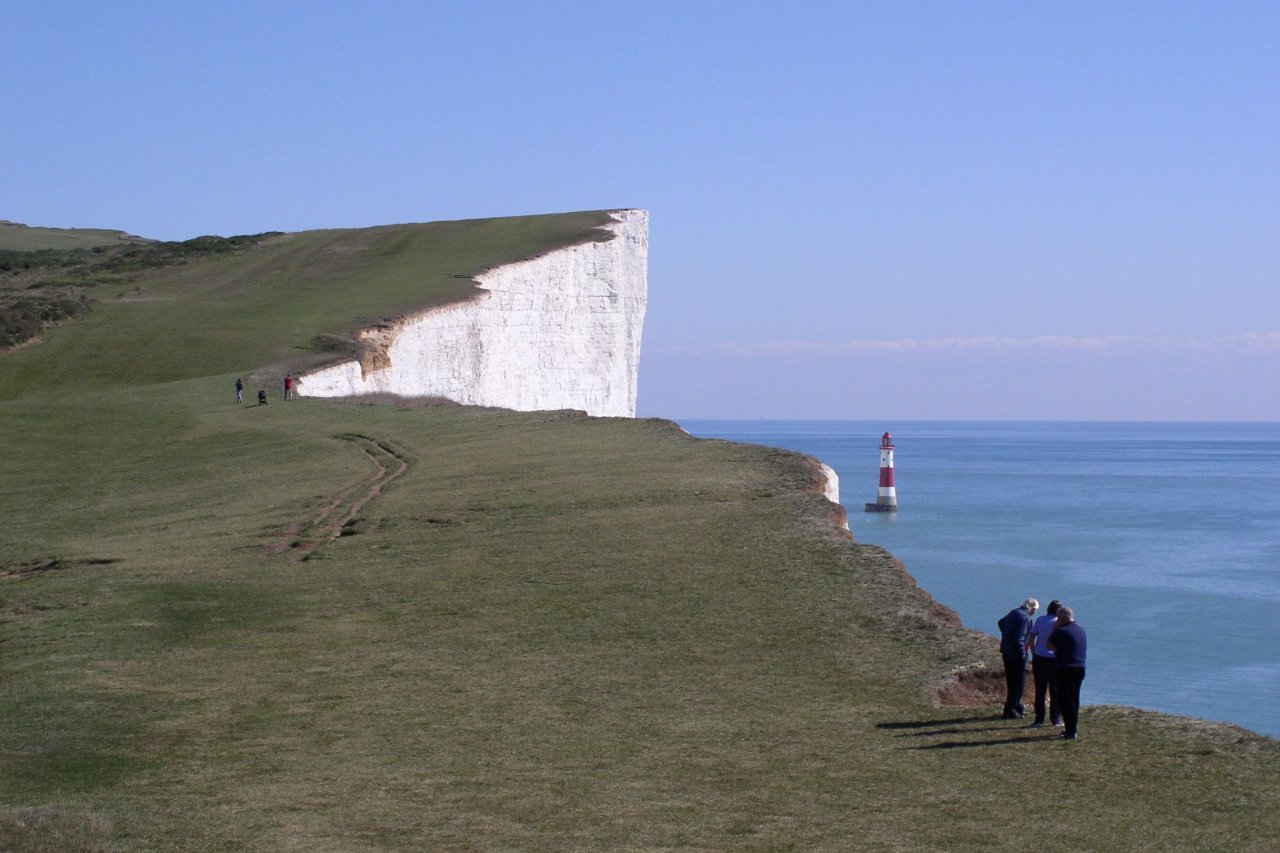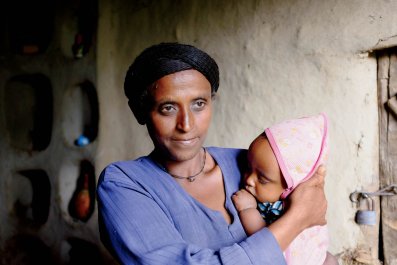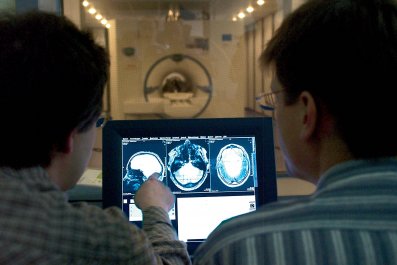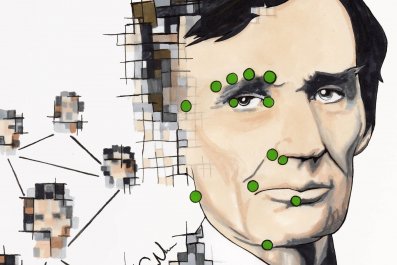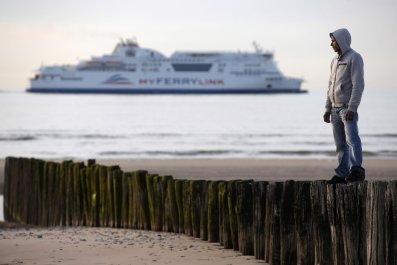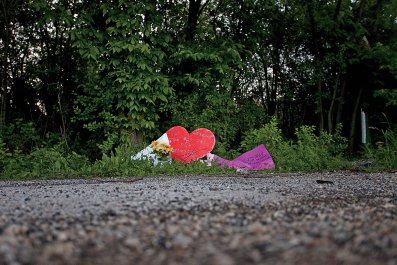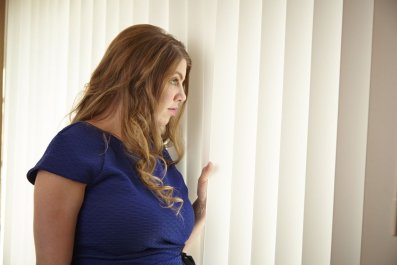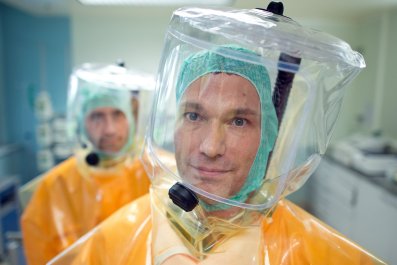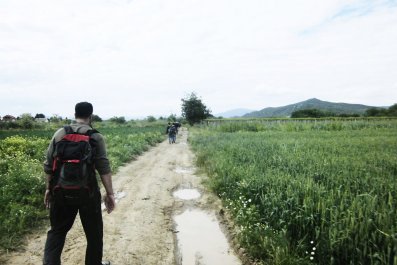The fall from the top of the white chalk cliffs at Beachy Head takes five seconds. One, two, three, four, five, and on to the rocks below. "Time enough to regret what you have done," says Andy Nippard, as he walks along the edge. This landscape is spectacularly beautiful, one of the wonders of the southern English coastline, but it is also deadly.
There is grass underfoot and the South Downs roll away to the left on a lovely, warm summer evening, but to the right is a sudden, shocking drop. The cliffs are 160m at their highest point and there is nothing to stop a fall except for an absurdly low, single-wire fence.
"I did see a man go over," says Nippard, who is dressed in a bright red polo shirt with the word "chaplain" spelled out in gold letters. He is a member of the Beachy Head Chaplaincy Team, a group of volunteers who watch and walk the cliffs in all weathers, every day and night, looking for the lost and lonely and the suicidal. They have done this for 10 years without giving interviews, for fear of drawing any more despondent people to the place, but now they are having to break their silence because of a financial crisis that threatens to stop their work.
Newsweek has been given unprecedented access to the patrols over a number of weeks. It was during one of these that Nippard, a 47-year-old care worker, recalls seeing a man on the edge with his back to the sea. "He looked at me and waited until I was close enough to see him properly. Then he spread out his arms and let himself fall backwards."
It takes 40 hours of classes and a year's apprenticeship to become a fully-fledged chaplain, but there is one other necessary qualification that angers some outsiders: you have to be committed Christian. The team was set up after a local pastor in the town of Eastbourne, East Sussex, had a vision he believed was from God. At first, every chaplain was a volunteer. Then, five years ago, there was a sudden surge in the number of people coming to the cliffs, following a heart-breaking, high-profile case. A couple who had suffered the death of their disabled son put his body in a back-pack and jumped together from Beachy Head. To cope with the consequent rise in the number of cases of suicide, the trustees of the charity that runs the team decided to pay four of the existing volunteer chaplains to work full-time, along with a director and administrator.
Their job was to lead and train the dozen or so unpaid volunteers, as well as covering extra hours. Supporters donated customised Land Rovers with searchlights and heat-seeking cameras. The trustees had faith that God would provide the money to meet the salaries and higher running costs, but after living hand-to-mouth for five years they had to admit it was not working. Donors were told in June that unless more money was found quickly, the team would have to disband and sell its equipment to pay a month's wages.
The four professional chaplains were made redundant, although one – Andy Nippard – has since returned on a much-reduced salary. He works far more hours than he is paid for. So does Mark Pybus, the team director who runs the office and then patrols for free, along with 14 volunteers.
The operating costs have been cut to £10,000 a month, which covers salaries, petrol, office hire, telephone and the care or replacement of equipment such as radios and the Land Rovers, which are in constant use. The appeal in June raised enough to save the chaplaincy in the short term, says Pybus, but the crisis is not over.
"What we need is a large number of people each giving a small amount of money on a monthly basis, and more volunteers. That is where the safety of this charity lies."
The team has just been honoured with the Queen's Award for Voluntary Service, but a question arises: why is this vital, life-saving work left to a small, closed group of believers? They work closely with the police and Coastguard, who treat them like another emergency service, so why are patrols not run and funded by the British authorities? "There is either not the will or not the resources for them to do what we do voluntarily," says Pybus, who estimates that a professional service covering the same hours would cost the taxpayer half a million pounds.
Beachy Head is often named as one of the three most notorious suicide spots in the world, alongside the Golden Gate Bridge in San Francisco and the Aokigahara Forest at the foot of Mount Fuji in Japan. All three have seen a rise in the number of suicidal visitors in recent years, as the global recession has hit hard, but the response in each place has been very different.
In San Francisco, where 46 people died last year, the bridge board has voted to fit a set of safety nets at a cost of $76m. No such prevention is possible in Aokigahara Forest, where people go to hang themselves or take an overdose. However, the local Yamanashi Prefectural Government runs workshops for those living near the forest, on how to approach and help the desperate people who go there. It also posts guards at the main access points.
In 2010 there were 40 suicides, but the authorities have stopped releasing the figures to reduce publicity. They have also banned filming inside the forest, so cannot be happy that Matthew McConaughey is currently shooting a movie set in Aokigahara called Sea of Trees. Forest scenes have been filmed at Purgatory Chasm in Sutton, Massachusetts.
Beachy Head is often used in the movies: Quadrophenia, Brighton Rock and the Harry Potter series have all featured scenes shot here. Last year, 34 people lost their lives on the cliffs. The chaplains took part in 865 searches and had personal encounters with 364 people they believed to be suicidal. Another is just about to happen.
Andy Nippard is on patrol with his wife Amanda, a care worker who has spent her free time up on the cliffs as a volunteer chaplain for the last five years. They see a man in a layby, leaning up against his car and being sick. Amanda approaches carefully, her husband keeping a few steps back to assess the situation. The man is in a bad way, having taken an overdose the night before.
"It didn't work," he says between retches, "So I have come here to jump." Having been sick so many times, he is only bringing up bile. Pale and shivering, he agrees to sit in the car, then slumps over the wheel.
"You have to have complete confidence in the person you are working with," says Andy, who checks the man's temperature while his wife keeps talking. The ambulance arrives, and takes the man to hospital. "We can normally tell the people who just want someone to talk to and the ones who are serious about doing it," says Andy afterwards. "This sounds dramatic but he would have jumped if we had not found him. He was in a right mess, physically and mentally."
The frustrating thing is that they never know how things turn out for the people they help. "We never find out what happens to them."
Suicide is not illegal in Britain, and there is growing support for the notion of assisted dying in some extreme cases, so don't the people who come to Beachy Head have the right to take their own lives if they want to?
Marion Bull, 51, a business writer who has been an unpaid volunteer chaplain for five years, says: "We are here to remind them that they have a choice. When they are on the edge they are in a desperate state, but we can say, 'Look, I know you are in pain but do you actually want to die?' Often they will say, 'No'."
Not everyone wants help, she says. "I had a knife pulled on me. A young woman was sitting cross-legged on the edge, scribbling away in a notebook. She sprang up and advanced in a swift, aggressive way. Then she pulled out a knife and said, 'Come any closer and I will stab you'."
She eventually agreed to come back from the edge and accept help, after a stand-off involving a police negotiator and lasting several hours. Such aggression is very rare, says Bull. "Most people are just broken-hearted, they are crushed."
The chaplains work in pairs and are trained to stay just out of reach, not least to avoid a wrestling match on the edge. They are skilful, determined and sincere, but isn't this a way of imposing their faith on others?
"Absolutely not," insists Pybus, who gives most of his spare time patrolling the cliffs. "Our first function when we meet somebody is to secure their life. Most commonly, it is they who ask us, 'Why do you care? Why are you doing this?' Then we will share our faith."
So far this year there have been 24 deaths at Beachy Head, which suggests the total will be much higher for 2014 than in recent years. Pybus blames the recession and cuts to mental health services.
"We are living in very desperate times at the moment in this country. There are massive cutbacks happening all over. Most of the people we deal with have some sort of depression. The hospital services are not there. The people working in mental health are very dedicated, but they don't have the resources to do all they would like."
It is a myth to believe that suicide has no consequences for anyone else, he says. "Your family will be devastated if you come here and take your life." What would he say to anyone thinking of doing that? "Find someone to talk to, that is the most important thing. The Samaritans are there to help. Your local GP is there for you. There are crisis centres available through the NHS. There are many places to go to talk and get help, so if you are in any kind of trouble, please do that as soon as you can, before you think of coming here."
The phone hanging on a lanyard around his neck suddenly rings. A taxi driver is worried about a woman in a wheelchair he just dropped off at Beachy Head. "Okay, we'll find her," says Pybus, into the phone. "On my way. . . "



